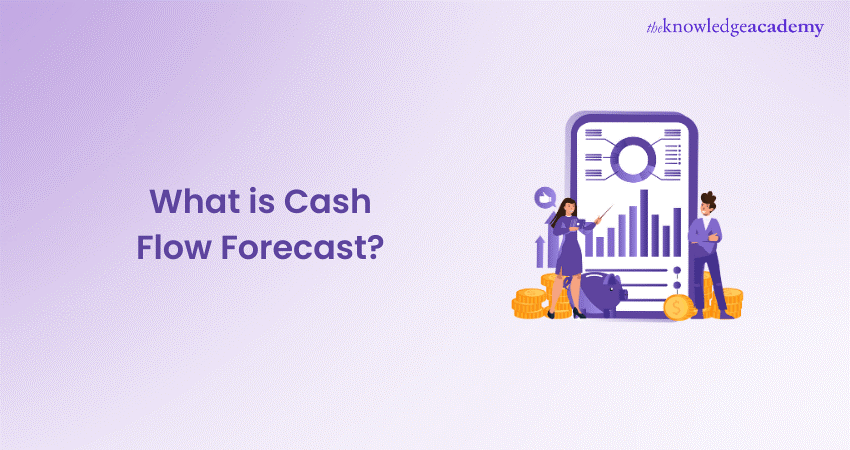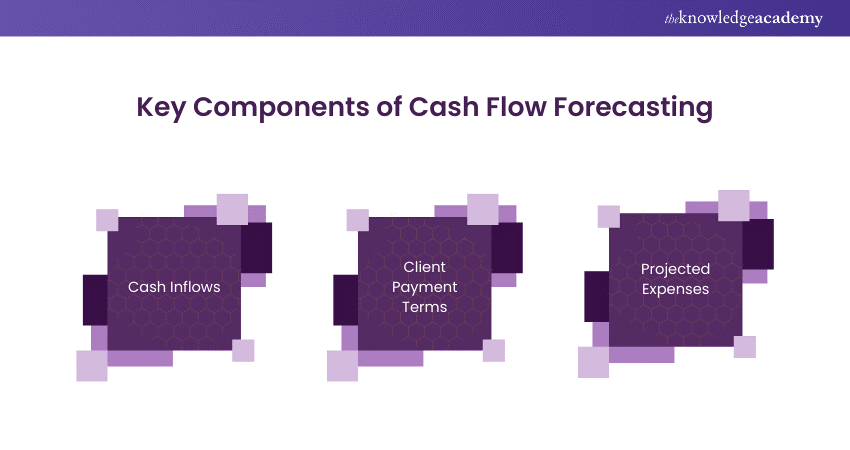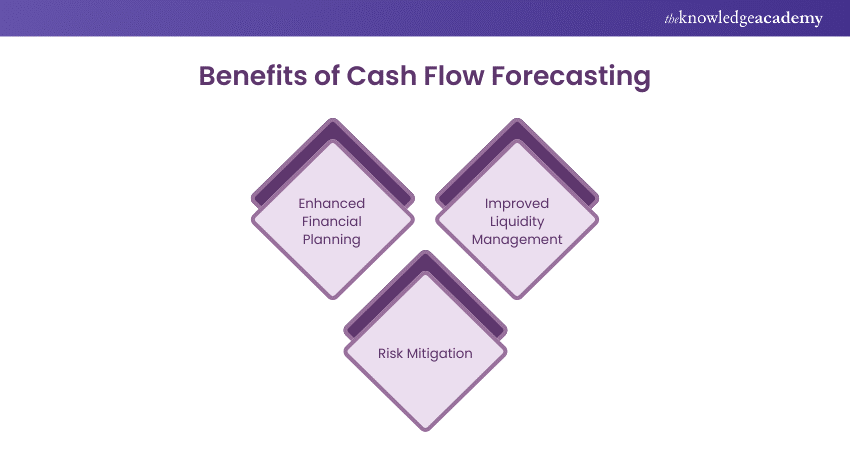We may not have the course you’re looking for. If you enquire or give us a call on 01344203999 and speak to our training experts, we may still be able to help with your training requirements.
Training Outcomes Within Your Budget!
We ensure quality, budget-alignment, and timely delivery by our expert instructors.

Imagine you’re the captain of a ship navigating the vast ocean of business finance. The sea is unpredictable—some days, it brings gentle waves of revenue, while on other days, it has stormy expenses crashing against your hull. To keep yourself in control, you need a reliable map—your Cash Flow Forecast. In this blog, we’ll explore the importance of Cash Flow Forecasts, their types, and key components to steer your business toward the destination of success and sustainable growth. Let's embark on this fruitful journey!
Table of Contents
1) What is Cash Flow Forecast?
2) The Importance of Cash Flow Forecasts
3) Different Types of Cash Flow Forecasts
4) Key Components of Cash Flow Forecasting
5) Steps to Forecast Cash Flow
6) Cash Flow Forecasting Examples
7) Benefits of Cash Flow Forecasting
8) Limitations of Cash Flow Forecasting
9) Conclusion
What is Cash Flow Forecast?
A Cash Flow Forecast is a financial tool that estimates a company’s future cash position by projecting all anticipated cash inflows and outflows over a specified period. This forecast helps businesses anticipate their liquidity needs, manage cash reserves, and plan for potential shortfalls or surpluses, ensuring they can meet financial obligations and make informed strategic decisions.
The Importance of Cash Flow Forecasts
Cash Flow Forecasts offer businesses a projected view of their cash position by estimating future inflows and outflows. This foresight enables companies to anticipate and prepare for potential cash shortages or surpluses, ensuring they maintain sufficient liquidity to meet obligations and seize opportunities.
Furthermore, by regularly monitoring cash flow trends, businesses can make informed decisions, manage expenses, and refine their financial strategies to ensure stability and support growth.
Different Types of Cash Flow Forecasts
Understanding the different types of forecasts can help you choose the right one for your needs. Here are the primary types of Cash Flow Forecasts:
1) Short-Term Cash Flow Forecast: This forecast focuses on periods from a week to a month. It helps manage day-to-day expenses and ensures liquidity.
2) Medium-Term Cash Flow Forecast: This forecast covers three months to a year. It assists in planning major activities, seasonal changes, and effective resource allocation.
3) Long-Term Cash Flow Forecast: This forecast extends from one year to several years. It is crucial for planning growth projects, making strategic decisions, and ensuring long-term financial stability.
4) Rolling Cash Flow Forecast: This forecast continuously updates projections based on actual performance. It provides a dynamic view by extending the forecast period as time progresses.
5) Scenario-Based Cash Flow Forecast: This forecast generates projections based on different scenarios, such as best-case and worst-case outcomes. It helps manage risks and develop effective contingency plans.
Secure your spot in our next Treasury Management Course – register here!
Key Components of Cash Flow Forecasting
To create an accurate Cash Flow Forecast, it’s essential to focus on its key components. Below listed are some of these components to help you provide a clear picture of financial inflows and outflows:

1) Cash Inflows
Cash inflows represent all anticipated incoming funds, including revenue from sales and investments. It's important to estimate these inflows to understand the cash available for future operations.
2) Client Payment Terms
Client payment terms outline the timing and conditions for clients to settle their invoices. Understanding these terms is vital for predicting when cash will actually flow into the business.
3) Projected Expenses
Projected expenses encompass all anticipated outgoing costs, such as operating and capital expenditures. Accurate forecasting of these expenses helps businesses manage their financial commitments and avoid cash shortfalls.
Steps to Forecast Cash Flow
Accurate Cash Flow Forecasting requires a structured approach. Follow these essential steps to create a reliable forecast:
1) Define Your Forecasting Goals
Set clear objectives for your forecast, such as managing cash reserves or planning for growth. Clear goals will focus your forecasting efforts and align them with your business needs.
2) Select Your Forecasting Timeframe
Determine the appropriate timeframe for your monthly, quarterly, or annual forecast. The timeframe should match your business’s needs and planning horizon for precise cash flow projections.
3) Decide on a Forecasting Approach
Choose a forecasting approach, such as direct or indirect methods. Your choice will influence how you project cash flows and interpret financial data.
4) Gather Essential Data for Your Cash Flow Forecast
Assemble relevant financial data, including historical cash flows, sales projections, and expense estimates. Accurate data is critical for developing a reliable and actionable Cash Flow Forecast.
Secure your spot in our Next Bookkeeping Course– register now!
Cash Flow Forecasting Examples
Cash Flow Forecasting involves:
a) Projecting cash from sales
b) Estimating future expenses such as salaries and rent
c) Accounting for loan repayments
For example, a retail business might forecast cash inflows from seasonal sales and outflows for inventory purchases and operating costs. This method enhances cash flow management and aids in planning for potential surpluses or shortfalls.
Benefits of Cash Flow Forecasting
Cash flow forecasting offers numerous benefits to an organisation’s liquid assets management.

a) Enhanced Financial Planning: Cash flow forecasting helps businesses anticipate future cash needs, allowing for better financial planning. By predicting inflows and outflows, companies can make informed decisions on budgeting, investments, and cost management.
b) Improved Liquidity Management: Regular cash flow forecasting enables businesses to ensure they have sufficient liquidity to meet obligations. It helps prevent cash shortages, allowing for timely payments to suppliers, employees, and other stakeholders.
c) Risk Mitigation: By identifying potential cash flow gaps or surpluses in advance, businesses can take proactive steps to mitigate financial risks. This could involve securing short-term financing, adjusting expenses, or renegotiating payment terms to maintain financial stability.
Limitations of Cash Flow Forecasting
Cash Flow Forecasting has several limitations. Since its accuracy depends on precise and complete data availability, forecasts can become unreliable if the reference is taken from incorrect assumptions or outdated information.
a) Uncertainty and Variability: Cash flow forecasting relies on estimates and assumptions about future events, which can be highly uncertain. Unexpected changes in market conditions, customer behaviour, or economic factors can lead to inaccurate forecasts, making it difficult to predict cash flows with precision.
b) Complexity in Large Businesses: For larger organisations with multiple revenue streams and complex operations, cash flow forecasting can become highly complicated. The more variables involved, the greater the chance for errors, making it challenging to create reliable forecasts without sophisticated tools and significant time investment.
c) Dependence on Data Quality: The accuracy of a cash flow forecast depends heavily on the quality of the underlying data. Incomplete, outdated, or inaccurate financial records can lead to misleading forecasts, which may result in poor financial decisions and planning.
Become an expert in Project Accounting – start your Project Accounting Course now!
Conclusion
Navigating the complexities of your business’s financial landscape can be challenging, but a well-crafted Cash Flow Forecast provides crucial insights. By mastering its types, components, and limitations, you can manage cash flows precisely and plan strategically. Additionally, leveraging forecasting as an integral tool empowers you to address financial challenges adeptly and make informed and impactful decisions.
Improve your financial management skills – Join Our Cash Cycle Management Course today!
Frequently Asked Questions

When forecasting cash flow, prioritise historical data, industry trends, and economic factors. Factor variables such as seasonal variations, payment terms, and potential risks. Lastly, use accurate data and realistic assumptions to enhance reliability.

The financial manager or accountant primarily manages Cash Flow Forecasting. They analyse financial data and project future cash flows to guide strategic decisions and maintain liquidity. Successful forecasting often involves collaboration across departments to ensure accuracy and comprehensive insights.

The Knowledge Academy takes global learning to new heights, offering over 30,000 online courses across 490+ locations in 220 countries. This expansive reach ensures accessibility and convenience for learners worldwide.
Alongside our diverse Online Course Catalogue, encompassing 19 major categories, we go the extra mile by providing a plethora of free educational Online Resources like News updates, Blogs, videos, webinars, and interview questions. Tailoring learning experiences further, professionals can maximise value with customisable Course Bundles of TKA.

The Knowledge Academy’s Knowledge Pass, a prepaid voucher, adds another layer of flexibility, allowing course bookings over a 12-month period. Join us on a journey where education knows no bounds.

The Knowledge Academy offers various Accounting Courses, including the Cash Flow Training, Project Accounting Course, and Cash Cycle Management Training. These courses cater to different skill levels, providing comprehensive insights into Financial Modelling Job Description.
Our Accounting and Finance Blogs cover a range of topics related to Financial Management and Accounting Practices, offering valuable resources, best practices, and industry insights. Whether you are a beginner or looking to advance your Financial Analysis skills, The Knowledge Academy's diverse courses and informative blogs have got you covered.
Upcoming Accounting and Finance Resources Batches & Dates
Date
 Cash Flow Training
Cash Flow Training
Fri 21st Feb 2025
Fri 25th Apr 2025
Fri 20th Jun 2025
Fri 22nd Aug 2025
Fri 17th Oct 2025
Fri 19th Dec 2025







 Top Rated Course
Top Rated Course



 If you wish to make any changes to your course, please
If you wish to make any changes to your course, please


